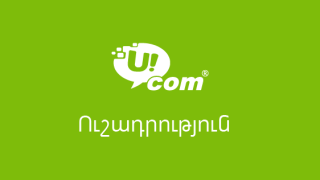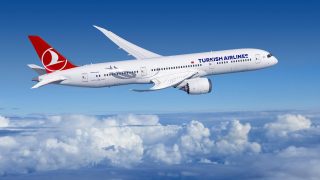Pablo Escobar: The Rise and Fall of The King of Cocaine
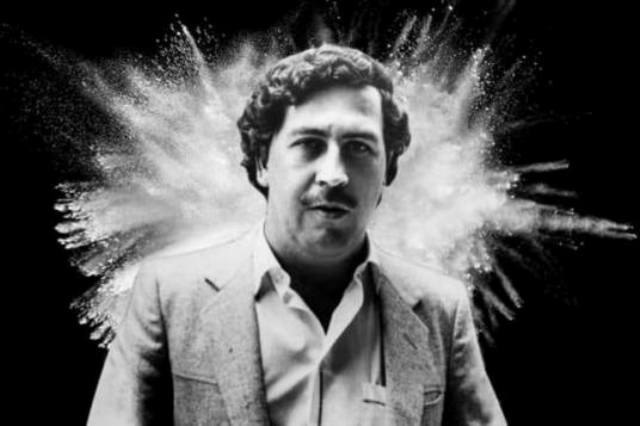
Born in 1949 in Colombia, Pablo Escobar (Full name: Pablo Emillio Escobar Gaviria) grew up in Medellin to become one of the wealthiest criminals in history, earning the title of “The King of Cocaine.” Perhaps, he was the most powerful mafia king in history, and a phenomenon of the past century.
In the height of his power, Pablo Escobar’s wealth reached unimaginable heights at the time. He led the most notorious mafia organization in human history, and even other mafia organizations in the country, with joint efforts of the Colombian government and the US Drug Enforcement Administration, were having a hard time to fight his empire and bring him down on knees.
Pablo Escobar’s son, Sebastian Marroquin (Juan Pablo Escobar), has turned his memories into a story woven around the cocaine empire of his father in his new book entitled “Pablo Escobar: My Father”, in which he seeks peace and reconciliation.
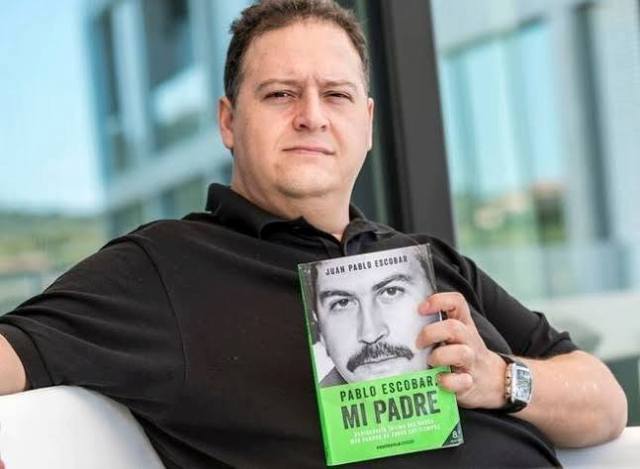
Escobar had the image of a Robin Hood among the poor people. He spent millions on parks, schools, football stadiums, hospitals and churches in Western Colombia. He even distributed money to the poor through housing projects and other civic activities. In 1982, Escobar was elected into the House of Representatives of Colombia’s Congress, which his son claims was his biggest mistake.
While Escobar enjoyed respect of people in Medellin, thousands of people suffered from his activity elsewhere, which included terror, killings and bombings to protect his wealth, cocaine business and escape punishment. He was cruel to people but liked animals.
Mafia Empire Built on Cocaine
Escobar started building his cocaine business in 1975.
Having been an outlaw from early ages, Pablo Escobar built his cocaine empire to its height and even employed a submarine and planes to smuggle his cocaine loads. According to some estimates, his wealth was beyond 28 billion in cash. Some publications say that he offered the Colombian government to pay off the national debt to the IMF (USD 21 billion at the time) before 1985 in an exchange for not being prosecuted for his crimes. However, his son, Sebastian, claims it is a myth.
Legend says Escobar would spend USD 2,500 a month just to purchase rubber bands to wrap his cash money.
Initially he smuggled cocaine in old plane tires and a pilot was paid as much as up to USD 500,000 per flight, depending on the weight of cocaine transported.
At some point his financial inflow was so much that he was unable to count the money. According to some estimations, at the peak of his financial richness his weekly income would reach USD 420 million.

Escobar’s richness bought him numerous properties, an art collection, which, according to some estimates, was the biggest one in South America, a huge piece of land that he turned into an estate called Napoles, occupying an area of 4,700 acres – an enormous property with jungles, rivers, lakes, mountains, exotic climate, where he brought over 1,200 exotic animals. The property also had a runway for planes to land, which was his main place of living and business. Though his money bought him countless properties, they never brought him peace and a place he could call home.
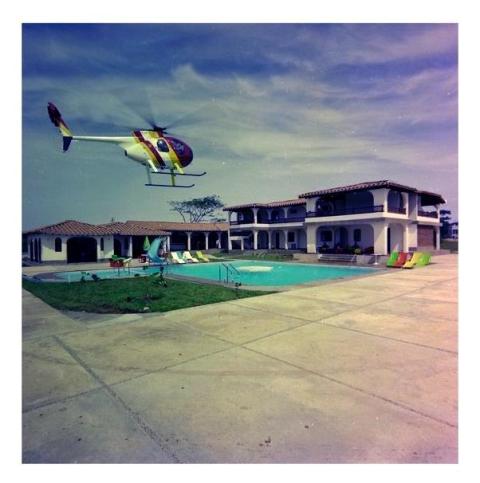
Young Escobar
In early 1960’s Escobar moved to La Paz with his family. He had a small room with a small library shelf, where, among other books and texts by communist leaders Lenin and Mao, he had a real human skull.
Once Escobar told the story of that human skull to his son: “Gregory [KM: this is how Escobar liked calling his son], one day I decided to challenge my fears, and the best way to do that was to sneak into a cemetery at midnight and steal a skull from a grave. Nobody spotted me, and nothing happened to me. After I cleaned it, I painted it and put it on my desk as a paperweight.”
Having fought his fears with unorthodox methods, Escobar was an outlaw from early age.
Escobar’s son recalls a story of his father’s young age, when Escobar and his cousin Gustavo managed to get their hands on the keys to the faculty lounge and secretly made copies of them with a mold made of modeling clay, which they used to steal blank diplomas and make a copy of the seal for validating those diplomas. They learned how to copy the handwriting of professors and started selling fake diplomas.

“My father and his friends became bolder in their crimes, and one day they stole the Cadillac belonging to the bishop of Medellin, who was attending a groundbreaking in the neighborhood. One of the boys studied at the National Training Service and knew how to hotwire a car. Once it was running, they went joyriding. The budding romance was interrupted in the second half of 1974, when the police stopped my father in a stolen Renault 4,” recalls Escobar’s son the story of how his father ended up in a prison for the first time.
Unlocking Outlaw Business Routes
While at prison, Pablo Escobar made his first connections in the underworld that would teach him to paths of smuggling. His first “mentor” to serious criminal career was Alberto Prieto, nicknamed “Godfather”, who was making fortune on smuggling cigarettes, whiskey and other products from a neighboring border to sell in Colombia. During the time of his incarceration he made friends with the “Godfather”, who bragged about his contacts with judges and political figures in Bogota. Pablo served only two months in prison, and due to his new prison friend’s efforts and connections, the evidence from the stolen Renault 4 case disappeared, and eventually judges dismissed the case.
Weeks after leaving the prison, the Godfather offered Pablo to join his smuggling business. Very soon, Pablo Escobar and his cousin Gustavo became famous with their courage and and ruthlessness among smugglers.
“A couple of times I became worried when policemen arrived and entered my father’s office. I thought it must be a raid, but they reappeared a few minutes later. They were there to collect money,” recalls Escobar’s son about how his father used to bribe police officers.
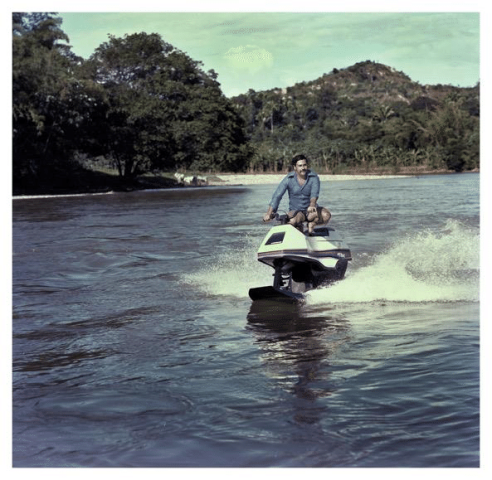
While smuggling business was flourishing, Pablo came to discover enormous money-making machine through smuggling something that was way more expensive – cocaine!
The Rise and Fall
While Pablo Escobar was gaining power and money, he was able to implement a successful political campaign, coupled with bribe and money distribution, and was elected into the Colombian parliament. This was a short-lived success as shortly he was impeached and deprived of his mandate due to allegations about narco-trafficking. According to Pablo’s son, his decision to get involved in politics was his biggest mistake.

As Pablo was fighting against extraditions so that the Colombian government would not be able to extradite drug cartel people to the US, his efforts were receiving strong backlash. The Colombian justice minister Rodrigo Lara Bonilla was strong in his position to persecute Medellin cartel and Escobar. “My father realized that Lara wasn’t going to stop attacking him, he ordered the minister’s assassination,” recalls Escobar’s son in his book. They armored a van and painted with red cross to appear as an ambulance, and for days were following the justice minister’s movements to assassinate him. One time they even got so close to him near the ministry when waiting for Lara that the minister’s bodyguards leaned back against this car, without suspecting that there was an armed gang inside that car waiting for the minister to come out to assassinate him.
He went so far in his fight that he started planning to kill presidential candidate César Gaviria as negotiations to give up on extradition efforts were unsuccessful. According to Escobar’s son, they persuaded a young man with terminal illness from a poor area to plot a plane bombing against cash to leave behind for his family. Gaviria had to be in this plane, however, due to some circumstances, right before the plane would take off he decided not to take that flight, but the bomb detonated, taking more than one hundred innocent lives.
“I never forgot that atrocious act. Over the years I’ve had the opportunity to meet many family members of my father’s victims and ask for their forgiveness on behalf of my father,” says Escobar’s son. He recalls that on one occasion he asked his father whether he believed in God, to which Escobar replied: “God is something very personal for every individual”.
By the year of 1992, the war against Pablo Escobar was being led by three powerful organizations, whose methods at times were as gruesome as Pablo’s methods. Those organizations consisted of a search bloc trained by US forces to become a special group to bring down Escobar’s organization, a shadowy organization of Escobar’s enemies called “Los Pepes,” which apparently had the support of the Colombian government too, and another powerful mafia organization called the “Cali Cartel”.
To clampdown on Pablo, police forces and these organizations were using gruesome methods, as a result of which massacres of poor neighborhoods were reported on media. On the other hand, Pablo’s mafia organization was employing methods such as dynamite explosions near areas where there were government buildings and civilians. They would often drive cars close to police checkpoints and when there were policemen near the vehicle, they would detonate the bombs with a remote control. They would also distribute hundreds of weapons to gangs in the Medellin slums to hide and retrieve as soon as they saw police forces around – this way they used people in poor areas as shields against police search forces. Such gunmen were encouraged to kill police people and were promised rewards based on the rank of officers killed. It was enough for an assassin to appear to Escobar’s people with a newspaper report to prove the killing of police officers to receive money reward. More than three hundred policemen were killed in a short period all over the city as a result of this hunt unleashed against police.
As the police was trying to find Escobar through extensive search methods, Cali cartel was plotting against Escobar too. On January 13, 1988, when Escobar’s family was hiding in a building called Monaco they owned, a car loaded with approximately 700kg of dynamite parked nearby was detonated. This was a huge explosion that looked like a huge mushroom from distance. “My mother and I were sleeping in the guestroom that night because the master bedroom was being remodeled. The concrete slab of the roof collapsed and pinned us to the bed, but luckily one of the corners caught on a small sculpture by the great Fernando Botero that was sitting on the nightstand,” recalls Escobar’s son.
According to some estimates, Pablo Escobar had the biggest art collection in South America, which included exceptional art pieces such as Rock and Roll by Spanish genius Salvador Dali, priceless paintings by Claudio Bravo, sculptures by Igor Mitoraj, Fernando Botero, and Edgar Negret.
The attacks unleashed by Cali cartel were as cruel as Escobar’s methods, to the extent that they started targeting people who had any relation or contact with Escobar, including a murder of his lawyer, as well as attacks on people in his vicinity.
After seeing dramatic pictures of victims as a result of war of his father, Escobar’s son told him that he didn’t agree with these violent methods resulting in the death of people, to which Escobar replied by saying that his family was the first victim as they targeted to kill them. “Don’t forget, the first victims of so-called narcoterrorism in Colombia were your mother, your little sister, and you when they bombed the Monaco building,” he responded. “I didn’t invent this. I am using the same weapon they used to try to destroy what I love most, which is all of you.”
The only time Escobar’s son saw his father crying was on September 18, 1993, before their departure to another hideout. This would be the last time they saw each other.
While Pablo was hiding, he tried to take his family out of Colombia by arranging a travel to Germany for them, with the destination being Frankfurt. However, the government had been able to track down their route and return them to Colombia, after which they were put to live in a hotel under government forces protection. Even though Pablo would keep all communications brief and he knew his calls would be listened to, while in exile he had started to abandon his habits and called and talked to his family, as a result of which he was tracked down by the Search Bloc and Los Pepes.
Being worn out of his wealth and loyal people in this war, Pablo Escobar was gunned down to death on December 2, 1993, when trying to run away from forces that were chasing him on a roof of houses.
While there were bullets that wounded Escobar, his son believes the terminal shot that killed him did not come from police, as it was an unidentified bullet. He believes his father killed himself not to let the ones chasing him do it. “I remember one time my father mentioned the possibility of taking his own life. He was talking with one of his men over the radiophone during a raid. I never forgot what he said. Nor did I know that it had been recorded by the Search Bloc and that I would hear it again long after his death: “Those bastards will never fucking take me alive.”
After Escobar’s death, his family had the sword of Damocles hanging over their neck for many years to come. Having been left with no money and human support, even their closest relatives left them. Even one of their close relatives who was supposed to collect money from one of their estates for them to pay for their living, took all for herself and gave nothing to them. During a court process, Escobar’s son asked to say a word on the record, and said the following about his relatives: “I want it to be quite clear that I am ashamed to have to turn to the judicial system to remind my father’s siblings that Pablo Emilio Escobar Gaviria existed and was their brother and their sole benefactor. Not a single member of my paternal family ever made a living on his own. All of them, without exception, have what they have today because of my father, not through their own efforts. Colombia hasn’t forgotten who Pablo Escobar was, but his own family has.”
Being left alone and with no money, Escobar’s family had to struggle for survival.
He Had Built a Prison for Himself
After assassination of a presidential candidate, the Colombian government multiplied its efforts to clamp down on Escobar, but results would not come that easy. Escobar’s terror had pressed the Colombian government to the wall, and eventually in May 1991, the Colombian government provisionally agreed to halt their proceedings for extradition and issued Decree 1303, which contained all of Escobar’s demands.
This was a deal on Pablo’s terms, but not the government’s. Through issuing this decree, the Colombian government convinced Pablo to surrender, but Pablo had his own terms: he would build a prison for himself and live in this prison by his rules. Escobar was confined in a luxurious private prison which was known as “La Catedral”. He continued his criminal activities from within La Catedral – he would accept guests, invite ladies for passing time, and host his family on weekends. Even the security guards that were supposed to watch for the “prisoners” not to escape were his own people. He had everything in his own prison, but within limited area of movement, and perhaps with better security. This was not a solution for the Colombian government, but an interim decision to win time and ponder new ways of fighting Escobar’s criminal empire.

There were a number of attempts by the Colombian government to move him to another prison, but Pablo had everything under his control. A number of times his boys got nervous as they felt an imminent attack was coming to them, but Escobar told them everything was under control:
“Guys don’t get nervous yet. When you see me tie my sneakers, then you can go ahead and worry.”
Eventually La Catedral was stormed and he escaped again.
Strong Wife Saves her Children in Exchange for Everything Else She Had
After Pablo’s death his family received numerous threats, and it was clear that they would be chased to be killed by other mafia groups in the country. Pablo’s wife tried to arrange a meeting and offer all the wealth her husband had left behind, only to save the lives of her children.
As she was able to get a chance to meet mafia people and talk, she was shocked to see that one of their loyal people from their surrounding came to pick her up. Having no one on her side, now the lives of her children depended on her solely.
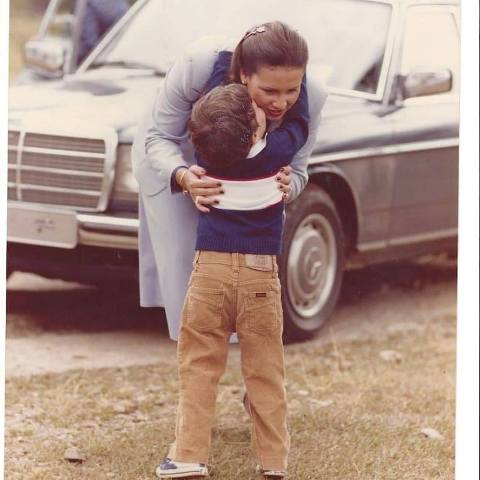
When time came to go to that meeting with other cartels, Pablo’s wife dressed in mourning clothes, and when she entered the place for meeting, she found more than forty people representing Colombia’s top narco-trafficking mafia leadership and Pepe kingpins.
They had left an empty chair for Pablo’s wife to seat. A dramatic conversation unfolded, with every type of threat to kill and dismember her family members, including herself, but Pablo’s wife was definite, and she was there with the only goal to save her children, even if she would lose everything else in the world.
In this tense environment, each of the cartel representatives started throwing threats at her saying how many friends and relatives of theirs had been killed by her husband. One said that Pablo had robbed huge amount of money, and her wife was in the position to return everything. Someone else said that they were planning to kill her children, dismember them and send in a bag to her husband.
In answer to these threats, Pablo’s wife said that the war was over, and she was there with an ultimate goal to save the lives of her children, and she was ready to make peace by giving everything she had, just to save the lives of her children.
One of them posed a rhetoric question to Pablo’s wife: “I want to know, I want you to answer me this: if it was our wives who were sitting here with your bastard husband, what would he be doing to them? Something horrible, because he was a terrible man. Answer me!”
“God’s ways are wise, gentlemen, and only God knows why I’m the one sitting here and not your wives,” Escobar’s wife responded.
This statement paced the situation down to some extent, and one of them said that if she came to make peace, they would make it, however without her son – they claimed the life of Pablo’s son. “My mother burst into tears and replied that peace without her son was not peace,” recalls Escobar’s son.
One of the participants said that the only reason they allowed her to appear in front of them and speak to try to make peace was that she had not been supporting the brutal methods of her husband. “You’re sitting here because we listened to your conversations, we recorded you, and you were always trying to resolve matters; you never told your husband to expand the war or try to kill us. In fact, you were always asking him to try to make peace with us. But how could you have supported such a brute unconditionally? How did you write that bastard love letters? Especially when he was always cheating on you? We’ve made our wives listen to the things you said on those tapes so they can hear how a good wife should support her husband!”
Eventually, this strong woman was able to negotiate and make peace with her husband’s adversaries, in exchange for everything she had – money, properties, art collections and everything else. She was left with nothing, but now she had her children alive, even though they had to live in exile for years to come.
Two Decades in Exile
Afraid of imminent death threats, Escobar’s family knocked at all doors to find refuge in other countries. They applied for visas and were rejected by embassies of Costa Rica, Germany, Israel, Australia, Argentina, Brazil, Canada, Venezuela, El Salvador, Italy, Peru, Ecuador, Chile, France, England, and the United States. They even applied to the catholic church and International Committee of Red Cross – without any result. Nobody wanted to help them because of what Pablo Escobar had done to people.
One day they were offered to have a meeting with someone, who turned out to be a diplomat of Mozambique from New York. This man offered them to settle in Mozambique. Left with no choice, even this option was a bright hope for them to save their lives. Eventually they left for Mozambique, where they stayed for a short time with no conditions for normal life. After Pablo’s son started protesting and fell into depression, to the extent that once he even said he would commit suicide, their mother started looking for new ways out of Mozambique.
They were able to arrive in Buenos Aires, where they lived with different names. Pablo’s son lived under a new name as Juan Sebastián Morroquin Santos. Soon their identities were uncovered, and Escobar’s family members were arrested. They spent time with whole family in prison.
In all this journey of life-saving escape, Juan Sebastian’s fiancé was with him – she climbed the plane with her love, and followed him through all hardships. It was years later, now in prison only, that Pablo Escobar’s son found time to propose Andrea for marriage, which she accepted with joy and love. They decided to get married as soon as they would get out of prison.
Sebastian was left out of prison earlier than his mother. He worked day and night to make ends meet, to take care of his sister and fiancé, as well as try to bring her mother to freedom. In 2001 his mother was set free.
As the nightmare was over, Sebastian decided to chase his dream and graduated from the University of Palermo with a degree in architecture. Currently he lives in Argentina with his family, and works as an architect.
In December 2002, Sebastian and Andrea wanted to get married, but the marriage was not being authorized to be made outside the Catholic church. Sebastian’s mother, one more time, came to prove that she was a strong woman – she achieved the impossible: the bishop of Buenos Aires, Jorge Mario Bergoglio, authorized the wedding. Against all odds, Sebastian’s mother managed to secure an audience with the man who would become Pope Francis.
Truth and Reconciliation
After the death of his father, Sebastian swore to avenge for his death, but he broke his promise. “All of us have the right to change, and for more than two decades I have been living a life guided by clear rules of tolerance, peaceful coexistence, dialogue, forgiveness, justice, and reconciliation,” says Pablo Escobar’s son. He has apologized for the deaths of the victims of his father’s criminal activities, he has met with heirs of those victims to apologize and seek reconciliation.
Escobar’s son has recounted the story of his father, as one of the most powerful mafia leaders in the history of humanity, but through his prospective of regret and reconciliation. Many people believe, that he was a victim too.
On one occasion he saw his father smoking marijuana, and as a conversation was unfolded between the father and son, his father told him he should not ever use drugs – the man who supplied tons of cocaine to the world gave a master class to his son on the negative aspects of drugs.
Now Pablo Escobar’s son lives in Argentina with his family and works as an architect to earn his living. He does not and will never have the money and power his father had, but now he has peace of soul his father never had.
Pablo Escobar’s son reconciled his memories into his book dedicated to his father, but left the following message for readers:
“To my father, who showed me what path not to take.”
By Kamo Mayilyan
Toronto-Yerevan
Kamo Mayilyan is a Canadian-Armenian Entrepreneur,
contributor and member of the Union of Journalists of Armenia
Kamo wrote the foreword to a book about Canadian and American missionaries and their efforts to save lives during WWI (“Grit and Grace in a World Gone Mad: Humanitarianism in Talas, Turkey 1908-1923”, by Canadian writer Wendy Elliott). The book can be purchased from amazon online store.









